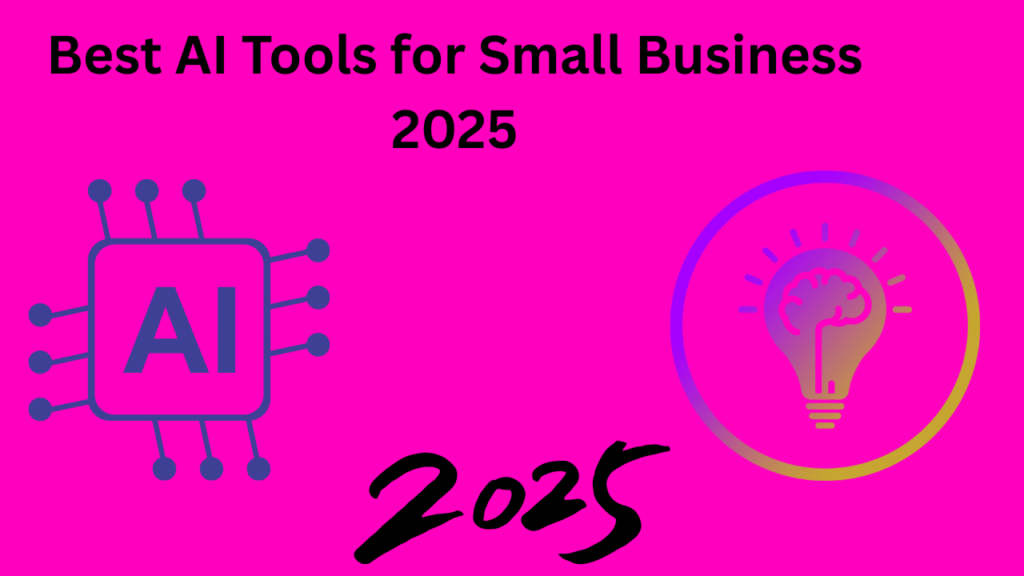Best AI Tools for Small Business 2025

Introduction
In 2025, artificial intelligence will increasingly shape the landscape of small business operations. AI tools offer innovative solutions that enhance efficiency, streamline processes, and improve customer experiences. This article explores the best AI tools for small businesses in 2025, highlighting their features, benefits, and how they can transform your business.
1. What is AI and Its Importance for Small Businesses?
1.1 Definition of AI
Artificial Intelligence refers to the simulation of human intelligence in machines programmed to think and learn. AI can process vast amounts of data, recognize patterns, and make decisions, significantly benefiting small businesses.
1.2 Importance of AI for Small Businesses
- Efficiency: Automates repetitive tasks, freeing up time for employees.
- Cost Savings: Reduces operational costs through automation and improved processes.
- Enhanced Customer Experience: Personalizes services and improves customer interactions.

2. Key Features to Look for in AI Tools
When selecting AI tools for your small business, consider the following features:
- User-Friendly Interface: Tools should be easy to navigate for all team members.
- Scalability: Ability to grow with your business needs.
- Support and Training: Availability of customer support and training resources.
- Integration Capabilities: Seamless integration with existing software and tools.
- Seamless integration with existing software and tools.
3. Best AI Tools for Small Business 2025
3.1 Chatbots and Virtual Assistants
Example: ChatGPT
- Overview: Chatbots like ChatGPT provide 24/7 customer support, answering queries and guiding users through processes.
- Benefits: Reduces response times, improves customer satisfaction, and allows human employees to focus on complex issues.

3.2 AI-Powered Marketing Tools
Example: HubSpot
- Overview: HubSpot uses AI to analyze customer data and optimize marketing campaigns.
- Benefits: Enhances targeting and personalization, improving conversion rates and ROI on marketing efforts.
3.3 Accounting Automation Tools
Example: QuickBooks
- Overview: QuickBooks integrates AI to automate bookkeeping tasks, invoicing, and expense tracking.
- Benefits: Saves time, reduces errors, and provides real-time financial insights.
3.4 AI for Human Resources
Example: BambooHR
- Overview: BambooHR uses AI to streamline HR processes like recruitment, onboarding, and employee management.
- Benefits: Improves hiring efficiency and employee engagement through data-driven insights.

3.5 Customer Relationship Management (CRM) Tools
Example: Salesforce
- Overview: Salesforce employs AI to analyze customer interactions and predict future behaviors.
- Benefits: Enhances customer relationships and sales strategies through data analytics.
3.6 AI for Inventory Management
Example: TradeGecko
- Overview: TradeGecko uses AI to optimize inventory levels and manage supply chains.
- Benefits: Reduces stockouts and overstock situations, improving cash flow and efficiency.
3.7 Social Media Management Tools
Example: Hootsuite
- Overview: Hootsuite leverages AI to schedule posts, analyze engagement, and recommend content.
- Benefits: Saves time on social media management and improves engagement rates.

3.8 AI-Driven Data Analytics
Example: Google Analytics
- Overview: Google Analytics uses AI to provide insights into website traffic and user behavior.
- Benefits: Helps businesses make informed decisions based on data trends and patterns.
3.9 AI for E-commerce
Example: Shopify
- Overview: Shopify integrates AI to enhance the e-commerce experience through personalized recommendations and customer insights.
- Benefits: Boosts sales and improves customer satisfaction by tailoring shopping experiences.
3.10 AI-Powered Project Management Tools
Example: Asana
- Overview: Asana employs AI to optimize project planning, task assignments, and deadline tracking.
- Benefits: Increases team productivity and ensures projects are completed on time.
4. How to Implement AI Tools in Your Small Business
4.1 Assess Your Needs
Identify specific areas where AI can add value, such as customer service, marketing, or inventory management.
4.2 Research and Choose the Right Tools
Evaluate different AI tools based on features, pricing, and compatibility with existing systems.
4.3 Train Your Team
Provide training to ensure employees understand how to use the new tools effectively.
4.4 Monitor and Optimize
Regularly assess the performance of AI tools and make adjustments as needed to maximize benefits.

5. Challenges of Adopting AI Tools
5.1 Cost of Implementation
Initial costs for AI tools can be high, which may be a barrier for some small businesses.
5.2 Data Privacy Concerns
Using AI involves handling sensitive data, raising concerns about privacy and security.
5.3 Resistance to Change
Employees may be hesitant to adopt new technologies, necessitating effective change management strategies.
6. The Future of AI in Small Business
6.1 Increased Accessibility
As AI technology advances, it will become more affordable and accessible for small businesses.
6.2 Enhanced Personalization
AI will continue to improve the personalization of customer experiences, driving engagement and loyalty.
6.3 Integration with Emerging Technologies
AI will increasingly integrate with other technologies, such as IoT and blockchain, offering new opportunities for small businesses.

7. Case Studies of Small Businesses Using AI
7.1 Case Study 1: Retail Success with AI
A small retail store implemented AI-driven inventory management, resulting in a 30% reduction in stockouts and improved sales.
7.2 Case Study 2: Enhanced Customer Service
A local service provider adopted a chatbot, leading to a 50% reduction in response time and increased customer satisfaction.
8. Resources for Learning More About AI Tools
8.1 Online Courses
Platforms like Coursera and Udemy offer courses on AI and its applications in business.
8.2 Industry Blogs and Websites
Websites such as TechCrunch and AI Business provide insights and updates on the latest AI trends and tools.
8.3 Networking Events
Attending industry conferences and webinars can help small business owners connect with AI experts and peers.
9. Conclusion
The best AI tools for small businesses in 2025 are set to revolutionize operations, enhance customer experiences, and drive growth. By embracing these technologies, small businesses can remain competitive in an increasingly digital landscape. As AI becomes more integrated into everyday operations, the potential for innovation and efficiency will only continue to expand.

read this beutifull articlehttps://www.xafsashariif.com/what-are-the-key-factors-for-business-success/






